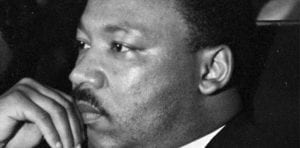 Teaching Center Luncheon
Teaching Center Luncheon
Dr. Marla Frederick,
Professor of African and African American Studies and the Study of Religion, Harvard University
“Between Racial Reconciliation and Social Justice: The Challenge of Contemporary Christianity”
On Wednesday, January 18, as part of MLK Week at Belmont, Dr. Marla Frederick led a Teaching Center lunch discussion for an engaged and attentive audience in an effort to open up dialogue about “racial reconciliation” and the related ideals of “diversity” and “inclusion”. Below are comments from participants after the discussion.
“Dr. Frederick’s timely message was welcomed. Her authenticity and courage allowed me to leave the luncheon both challenged and hopeful. Her call to engage students- their histories, and racial identities, to consider our call as faith communities and citizens, to lean into this conversation were striking. These ideas keep swirling in my mind since her visit, and have come up in conversations with students and faculty. One quote I jotted down in my notebook was:
“We lack DEPTH in our knowledge and understanding these days, as we live on sound bites.”
So I want to read her books and those she recommends – I want to continue to participate in the conversation with our community in a deeply knowledgeable way.”
“I appreciated her perspective and found her work at Harvard in religion and diversity intriguing. Since our campus is talking about how to integrate more targeted learning in diversity, I think some of her work and experiences may be helpful to us going forward. It is evident that we are interested in developing thoughtful ways of teaching our students across their entire educations how to be responsive to all peoples and how to really value one another.”
“By the time I had returned to my office after the luncheon, I had developed (in my head) a First Year Seminar course on Science and Citizenry, complete with topics and readings, merely because I heard and understood Dr. Frederick say “citizenry” in a way that I had not considered before. Her comments about not reading literature by African-American authors for her first 12 years of her education was my experience, too. How can this be? Doug Murray’s story of the history of Belmont characters left be gob-smacked. How do we not know and teach this history to our students? (Maybe we do?). Dr. Frederick shifted my way of thinking and I am grateful for the opportunity to have heard her speak.”
“I was moved by Dr. Frederick’s story of never reading anything by an African-American. I thought about how often the mathematicians we talk about are white males, even though there are lots of women (white or not) and men from other racial backgrounds who have made contributions. It made me more aware of sharing the diversity of mathematics. In fact, I started a Google Map where I’ve been “pinning” the locations all around the world tied to things we talk about in my Honors Analytics Math Models course and I hope to share this with them soon. I also immediately purchased two books she mentioned – The New Jim Crow by Michelle Alexander, and Between the World and Me by Ta-Nehisi Coates. I’ve started Alexander’s book and it’s a bit shocking – the statistics on mass incarceration in America are sobering.”
“Dr. Frederick’s presence on campus, and particularly in the Teaching Center luncheon, reminded me of two central truths about Christian higher education. The first responsibility of a Christian university—and of any university—is to be committed to the truth, and to telling the truth at every opportunity. This is no small or easy thing, particularly because it means we have to confront so many tragic and troubling aspects of our past and current situations. The second is equally important: a Christian university has to a place where all are welcome—particularly those who have been historically excluded from communities like this because of race, ethnicity, gender, sexual orientation, or religion. And these two truths go hand in hand: one does not adequately exist without the other. Dr. Frederick’s presence was a call to put aside pious pretentions and to hear God’s radical call to be an inclusive, truth-seeking community. In these days, I can think of no more important mission or vision.”